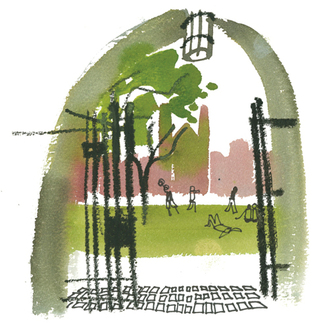 loading
loading
A rebel comes home Annabel WrightView full imageA decade ago, this magazine published a piece about the frustrations of fund-raisers trying to solicit significant monetary contributions from grads of the seventies. Apparently, we were known as the “disaffected” generation: “Some observers say this disaffection is fallout from the distrust of institutions and authority that characterized the college years of these alumni.” The “observers” were partly right. But they captured only one ingredient of our post-sixties, not-yet-eighties thought process. Our disaffection was headily complemented by our joyous newly found affection: for the triumph of the individual. Yes, we distrusted institutions—some institutions: those that propagated ideals so entrenched in tradition, so leached of self-examination, that they allowed ideologies to overshadow intellectual vigor. The banking industry. The Pentagon. The presidency that had warred in Southeast Asia without rational reason. We weren’t stupid enough to generalize that all “institutions” were, de facto, evil. Institutions—colleges, Buddhist retreats, Rotary Clubs, underground anarcho-syndicalist meetings—are not the kinds of things you can resent or distrust, any more than you can distrust or resent a species. To distrust institutions is to distrust civilization’s innate instinct to be social. Not even we were that addled. Who were we, then, my friends, my people at the time? We were smart, but more impressive to me—as individual expression was blossoming—my college colleagues seemed insanely talented. They were stunningly curious about everything and anything. They would become lawyers and pathologists, yes, but also architects, painters, journalists, religious studies PhDs, pianists, and poets. One of my favorite friends was on the varsity football team. We questioned. At a time when we’d just faced a draft lottery, and a majority of the nation’s voters had reelected a president we all thought the culture had long ago discarded, joining a pack didn’t seem like the right way to make things change. Not when loud voices of individual dissent—King Jr.; Bobby Kennedy; the Chicago Seven; Malcolm X—seemed to have a lingering, echoing effect. When I reached Yale, I was a good singer, but trying out for an a cappella group of white guys bound by patriarchal tradition held no lure for me. I was too cool to try out for any singing group. My musical group was a thrice-weekly huddle in front of a midnight fireplace with friends, to discuss the merits of B. B. King vs. Albert King, King Crimson vs. John McLaughlin’s Mahavishnu Orchestra. And although I’d won the drama prize at Choate, I’d panicked on registration day at Yale when someone at a table looked up and said, “You going for the undergraduate drama track, or the regular curriculum?” The former seemed to imply auditions and four years spent competing with like-minded egomaniacs; the latter, a chance to meet people interested in all sorts of things. On the spur of the moment, I chose the normal route. In retrospect, I’m glad that I did. (But how come no one had prepared me for that question? Had I known what the chances were of getting to the Drama School’s hallowed stage, I might have tried for it.) To satisfy my drama trope, I threw myself into a couple of small college productions, playing Teiresias at Davenport, and the First Witch in Berkeley (my hair was long enough to braid). Mostly, through all those years in New Haven, I knew I could write. But I wasn’t going to heel a storied campus paper just so that, some years hence, I might be on staff at the New York Times. To a curious, insecure, uncertain slacker-student, the Daily News presented itself as too much like a secret society. I knew nothing of the future. I’m not sure it even occurred to me there’d be one. Then, in June of 1976, I stood in a courtyard holding a piece of paper written in Latin. And later, after I’d written a half-dozen pieces for the New Haven Advocate, I convinced the real newspaper that yes, I could cover a baseball game without using mythical references. And thereafter I started to follow a wonderful, ever-beckoning path as a working man: from New Haven, to Washington, to San Diego, to Miami, to New York City, to Philadelphia, then to a very rural upstate New York village, where, for a very long time, I was paid ridiculous amounts of money to be on the staff of a national magazine down in The City, as long as I occasionally visited the offices. I even turned down the job offer from… yep, the New York Times. Yale? The place that had given me that Latin message in a leather folder? I’d send $25 every now and then, but assiduously avoided reunions. Reunions were for those guys Trudeau made fun of in Doonesbury strips.
|
|